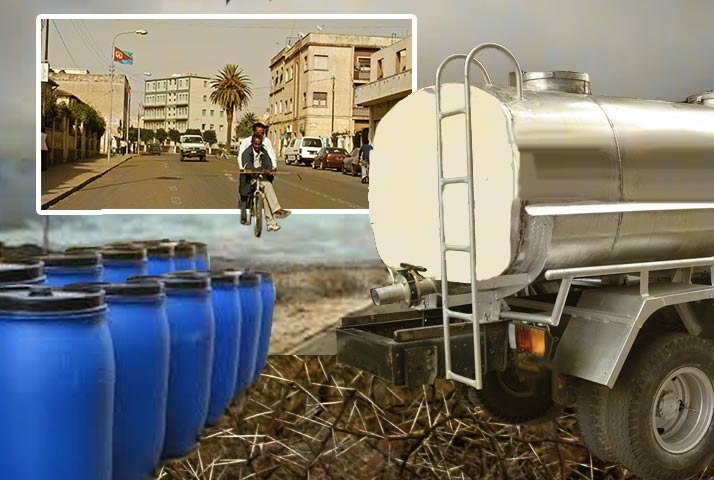EDA: Glitches & Deadlock Resurface
Gedab News (June 21, 2010): Almost a week after the mediation talks between the designated representatives of the opposition umbrella group of the Eritrean Democratic Alliance (EDA) and one of its member organizations, the Eritrean People’s Democratic Party (EPDP) ended, neither the EDA nor the EPDP has issued a statement declaring the final outcome of the talks which were facilitated by Ethiopia and lasted for almost a week.
On June 14, 2010, awate.com’s Gedab News reported that EDA and EPDP had worked out their differences. This news was based on information provided by and substantiated by several sources including EPDP sources. In fact the meetings had progressed to the point that the talk was about the end-of-session celebratory dinner which was being hosted by Ethiopia.
But whatever agenda item the two sides had scheduled to discuss the next day was deferred while the issue of how and why Gedab News came to report about the talks surfaced as an agenda item with EPDP accusing the EDA delegates of “leaking” the news and the EDA delegates furiously denying that they were the sources for the news. No party said what was actually “leaked.”
On June 15, 2010, the EPDP issued a statement which reported that “the truth is that no glitches have been ironed out yet.” This was, in tone, different from EPDP’s own report of June 11, 2010 which had indicated that “contrary to unfounded rumours being fabricated by certain ill-wishing quarters, the talks between the leaderships of the Eritrean People’s Democratic Party (EPDP) and the Eritrean Democratic Alliance (EDA) are progressing well under a normal atmosphere.”
Though the EPDP stated that talks “are still under progress,” the meeting dispersed only a few hours after the statement was released.
After spending all day discussing issues that they had been discussing since February, by the next day, the delegates had dispersed and neither side has issued an official statement of the outcome. Asked why there is so much urgency to “prove awate wrong” and to rush statements while, a week after a meeting ends, there is no similar urgency to issue a statement about the outcome, an EDA official stated that he really “does not want to add fuel to the fire” but invited us to ask ourselves why there is no media coverage about an event that is supposed to be about a congress, which is the people’s business.
Another stalemate has been reached. EPDP has told EDA that if it insists on holding the congress on July 30 without resolving the various issues the EPDP had raised, EPDP would have no choice but to skip the congress and “attend the next one.”
Background
As long as there has been an opposition umbrella group, dating back to 1999, there has been talk of holding a national congress. In 2005, the Eritrean Democratic Alliance vowed that it would make it happen and after a number of workshops, a congress preparatory committee was set up in October 2009.
The congress preparatory committee is composed of 21 individuals: 13 members from the then-13 member EDA (the unification of EDP, EPP, and EPM did not occur until December 31, 2009), and 8 members from the civil society.
While there are many issues that keep piling on to aggravate the dispute, the main ones are the following:
1) Impartiality of the eight civil society members: The EPDP has expressed its reservations that the 8 members of the civil society are either partial to other members of the EDA, or hostile to EPDP, or harbor views that are in stark contrast to EPDP’s vision of bringing about democratic change in Eritrea.
The EDA (and the 8 civil society representatives) argue that the representatives of the civil society are independent and that they have no affiliation with the other members of the EDA.
As a compromise, the congress preparatory committee proposed that the EPDP name two more representatives to the congress preparatory committee. The EPDP dismissed this offer as “extra-legal” and inadequate in addressing its reservations about the impartiality of the civil society members.
2) Preparatory Work: The EPDP believes that the groundwork required to prepare a successful congress—a preamble or a collectively understood statement of guiding principles—is lacking and, without it, the congress is unlikely to succeed in the goals it has set for itself. It is better, argues EPDP, to take the time to work out the kinks before the congress convenes, rather than arguing about what should have already been accepted as a guiding principle at a Congress being rushed to meet an artificial deadline.
The EDA and the congress preparatory committee counter that they are using the EDA Charter and the papers discussed at various workshops as the building block for the congress. If the congress is going to be a popular congress, they argue, all the so-called guiding principles should not be presented as a finished product which only require “acceptance with applause” but actually debated at the Congress.
3) Timing: The EPDP adamantly rejects the July 30 date set for the congress. It argues that more time is needed to prepare for such an important gathering.
The EDA argues that it cannot keep discussing dates and that, in any event, the EPDP was outvoted by a 10 to 1 margin and that it should abide by democratic principles and accept the vote of the supermajority.
In the end, the two sides could not overcome their mutual suspicions. The EPDP believes that the leadership of the EDA and “their allies” have been on a relentless campaign to diminish and marginalize it. And the leadership of the EDA believes that the EPDP is a paternalistic institution which has never come to terms with the fact that it is only one voice among many. The breakdown of the talks will be one more arsenal for each side to use in the mutual recriminations that always follow deadlocks.



Awate Forum